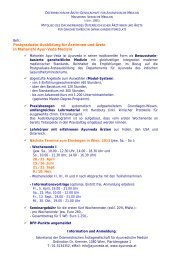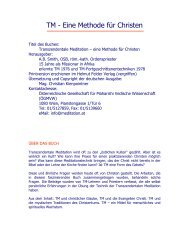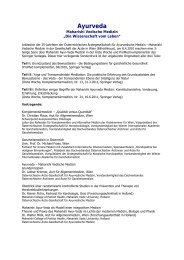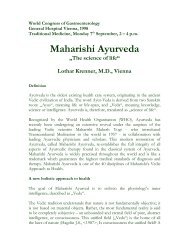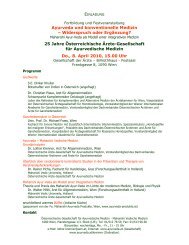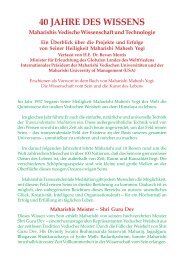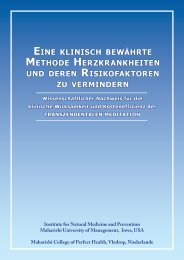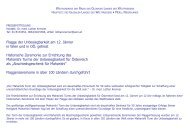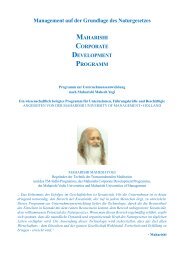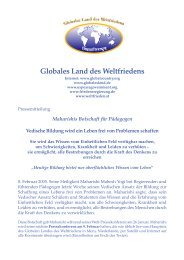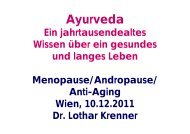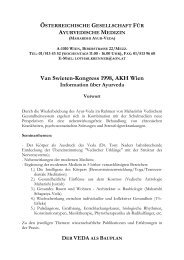Summary of Research Findings
Summary of Research Findings
Summary of Research Findings
Create successful ePaper yourself
Turn your PDF publications into a flip-book with our unique Google optimized e-Paper software.
Cancer <strong>Research</strong> (continued)<br />
Authors<br />
H.M. Sharma,* J. Krieger,** and C. Dwivedi.**<br />
Conducted at<br />
**Department <strong>of</strong> Pathology, College <strong>of</strong> Medicine, The Ohio State University, Columbus, OH 43210<br />
**College <strong>of</strong> Pharmacy, South Dakota State University, Brookings, SD 57007<br />
<strong>Summary</strong><br />
Ayurveda (Ayu = life, Veda = knowledge, meaning the science <strong>of</strong> life) is an ancient medical science originated<br />
from Vedic tradition and widely practiced in India. Maharishi-4 (M-4) and Maharishi Amrit Kalash (MAK),<br />
ayurvedic food supplements belong to a group <strong>of</strong> substances known as rasayanas (Glazer, 1988).<br />
In ayurveda, rasayanas are given to bring homeostasis in the physiology, retard aging, and enhance vitality and<br />
immunity (Sharma, 1985).<br />
M-4 and MAK have been shown to inhibit 7,12-dimethylbenz(a)antracene (DMBA)-induced mammary<br />
tumors in rats when given individually as a dietary supplement (Sharma et al., 1989). The purpose <strong>of</strong> this investigation<br />
is to study the effectiveness <strong>of</strong> the combination <strong>of</strong> M-4 and MAK dietary supplementation on DMBAinduced<br />
mammary tumors in rats.<br />
Fifty-day-old Sprague-Dawley rats were divided into 4 groups, having 20 rats in each group. Group 1 (C) and<br />
group 3 (P) were placed on a rodent chow diet (Wayne <strong>Research</strong> Animal Diets, Chicago, IL, USA). Groups 2 (I)<br />
and 4 (I and P) were placed on rodent chow supplemented with 6% M-4 and 0.2% MAK (provided by Maharishi<br />
Ayurveda Products International). All rats were given DMBA (75 mg/kg in 1 ml <strong>of</strong> sesame oil) by gavage after<br />
being on the diet for one week. One week after DMBA administration, the I group was placed back on the normal<br />
diet and the P group was placed on M-4 and MAK-supplemented diets. Rats were weighed and examined<br />
weekly for the presence <strong>of</strong> mammary tumors for a period <strong>of</strong> 20 weeks. In the other set <strong>of</strong> the experiment, animals<br />
with mammary tumors were placed on either M-4 or MAK-supplemented diets. Tumor size was measured<br />
once a week for 4 weeks. Histopathologies <strong>of</strong> tumors from different groups were also performed.<br />
After 20 weeks <strong>of</strong> DMBA administration, the tumor incidence was 60, 30, 25, 15% in C, I, P, and I and P<br />
groups respectively; the average number <strong>of</strong> tumors per rat was 0.65, 0.5, 0.35, and 0.35 for C, I, P, and I and P<br />
groups respectively. M-4 and MAK-supplemented diets caused tumor regression in 60% <strong>of</strong> rats. There was no<br />
significant difference in weight gain <strong>of</strong> rats in all the groups. The tumors from the C group had adenocarcinomas.<br />
The tumors from the I and P groups showed adenocarcinoma with extensive fibrosis and focal areas <strong>of</strong><br />
necrosis and calcification. The tumors from the I and P group showed lobular aden<strong>of</strong>ibroma with inflammation.<br />
These results indicate the M-4 and MAK-supplemented diets protect against DMBA-induced carcinogenesis.<br />
Similar results were observed when M-4 and MAK were supplemented in the diet individually at the same dosages.<br />
The combination <strong>of</strong> M-4 and MAK together in the diet does not produce synergistic effects.<br />
Abstract reprinted from European Journal <strong>of</strong> Pharmacology, Vol. 183, No. 2, p. 193, Copyright 1990, with permission from Elsevier<br />
Science.<br />
Study 6 <strong>Research</strong> Highlights<br />
MAK-4 and MAK-5 supplemented diets protected against DMBA-induced carcinogenesis in rats. Sup plementing<br />
MAK-4 and MAK-5 individually at the same dosages achieved similar results as combined supplementation.<br />
12



